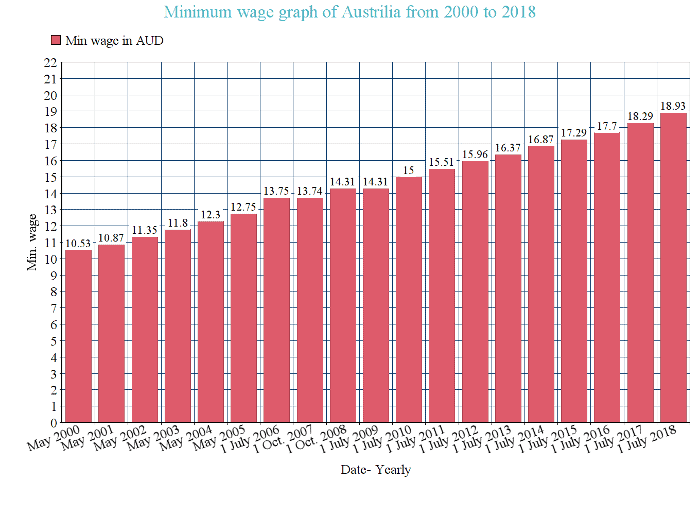Alex Tanglao
Alex Tanglao is a seasoned professional with expertise in startups, legal technology, and business management. Alex has held leadership roles, including Director of Strategy & Operations at Elevate Digital, where he streamlined operations and managed teams, and Director of Ecommerce at Allies of Skin, driving global growth. Alex served as Marketing Manager at Zegal, driving legaltech and educating businesses on startup legal topics. With a background in content strategy from LawPath, Alex combines a deep understanding of legal services with operational excellence and innovative marketing strategies to help businesses thrive in dynamic, fast-paced environments.
Need any help? Contact us:

Table of Contents
What is minimum wage in Australia ?? talking to the point by 1 July 2018 Australia minimum wage per hour is $18.93. But wait … minimum wages depends on classification of work.
Australia minimum wage 2017 was $18.29 per hour. The national minimum wage in Australia has increased by 3.5% by 1 july 2018. In June 2018, so by these The new national minimum wage in Australia in 2018 is $719.20 per week, for a 38-hour week, or $18.93 per hour.
While this was met with consternation by employers who felt that the minimum wage increase would impede employment growth, this highlights the reality that it is important for employers to keep up with employment regulations.
Related reading: 5 key legal considerations when hiring a new employee in Australia
A minimum wage is an employee’s base rate of pay for ordinary hours worked. In Australia, employers and employees cannot be paid less than their applicable wage, even if they agree to it. Wage must be define in Contract of employment in Australia. As an employer, one should be fair with their employees regarding payment and other entitled eligibility that includes parental leave, sick leave or overtime rates.
The wages and entitlements employee is eligible for can depend on:
- their age
- the state they’re in
- your industry
- their qualifications
- their work duties and responsibilities.

How is the minimum wage in Australia determined?
Every year, the FWC’s Expert Panel reviews the minimum wage rate in Australia, taking into account written submissions from interested organisations and individuals, consultations before the Expert Panel and research commissioned by the Expert Panel. Following the review, the FWC makes a national minimum wage order that will apply from the first full pay period on or after 1 July each other.
Fair work commission has set certain standard which dictates minimum grades of pay for different job roles across all industries, and if you aren’t fully aware of each of your employees’ minimum wages, you could find yourself underpaying them
Every year, the Fair Work Commission’s (FWC) Expert Panel reviews the minimum wages received by employees in the national workplace relations system.
The review considers:
- written submissions from interested organisations and individuals
- consultations before the Expert Panel
- research commissioned by the Expert Panel.
What are the current national minimum wage rates?
There are set of minimum wage for different kinds of job and awards in Australia, but all over the national minimum wage in Australia has determine The current minimum wage in Australia 2018 is $18.29 per hour or $694.90 per 38 hour week (before tax). It order sets out the following wages for employees not covered by an enterprise agreement or a modern award:
- a national minimum wage
- a special national minimum wage for:
- trainees, apprentices and junior employees
- employees to whom training arrangements apply
- employees with a disability
- a casual loading.
As stated above, apart from the national minimum wage, there are a range of special national minimum wage rates that apply to different categories of employees.
Special national minimum wage in Australia 1 – for employees with a disability which does not affect their productivity
The special national minimum wage in Australia for employees with disability which does not affect their productivity is the same as the national minimum wage of $694.90 per week, calculated on the basis of a week of 38 ordinary hours, or $18.29 per hour in the case of an adult.
Special national minimum in Australia wage 2 – for employees with a disability who are unable to perform the range of duties to the competence level required
This special national minimum wage in Australia rate applies to an employee which meets the following criteria:
- Employee with disability who is unable to perform the range of duties to the competence level required of an employee within the class of work for which the employee is engaged because of the effects of disability on their productive capacity;
- Employee meets the impairment criteria for receipt of a Disability Support Pension; and
- Employee is not a junior employee, or an apprentice, or an employee to whom a training arrangement applies.
Employees with a reduced work capacity due to their disability may qualify for the Supported Wage System (SWS). This is a process that allows employers to pay a productivity-based wage for people with disability that matches an independently assessed productivity rate.
According to Schedule A to the National Minimum Wage Order, an employee with disability can be paid a percentage of the relevant minimum rate, based on their assessed work capacity as assessed by a qualified assessor. For instance, a disabled employee with an assessed work capacity of 70% will get 70% of the classification in the award or registered agreement.
Learn more about pay rates for employees with disability.
Special national minimum wage in Australia 3 – for junior employees
A junior employee refers to an employee who is under 21 years of age. Juniors get paid a percentage of the relevant adult pay rate unless:
- the award, enterprise agreement or other registered agreement doesn’t have junior rates, or
- they have completed an apprenticeship and are trade qualified.
The minimum wage rate for junior employees is based on a percentage of the national minimum wage. To determine the applicable minimum wage rate for junior employees in your industry, use the Pay Calculator provided by the Fair Work Ombudsman.
Special national minimum wage in Australia 4 – for apprentices
In Australia, apprenticeships and traineeships are types of formal training arrangements that combine work with study for a qualification. These arrangements have to be formally registered with an appropriate state or territory training authority. Learn more about apprenticeships and traineeships.
In the case of apprentices, the pay rates vary for adult apprentices (an apprentice who is 21 years or older when they start their apprenticeship) and school-based apprentices (an apprentice who still goes to high school while completing the apprenticeship. If you are covered by a registered agreement, check the rates in the agreement.
The minimum wage rate for apprentices is based on the provisions in the Miscellaneous Award 2010 (clause 14) for apprentices. To determine the applicable minimum wage rate for apprentices in your industry, use the Pay Calculator provided by the Fair Work Ombudsman.
Special national minimum wage 5in Australia – for trainees
The minimum wage rate for trainees is be based on the provisions set out in the Miscellaneous Award 2010 (Schedule E) for employees to whom training arrangements apply. Trainees may also have other entitlements (e.g. penalty rates, overtime and allowances) from the industry or occupation award that covers them.
Different pay rates are applicable for different categories of trainees, whether a school-based trainee or a part-time trainee whose training is wholly off-the-job.
To determine the applicable minimum wage rate for trainees in your industry, use the Pay Calculator provided by the Fair Work Ombudsman.
What is the applicable minimum wage rate for employees covered by an award?
Most employees in the national workplace system are covered by a modern award. These contain the minimum wage, as well as other terms and conditions, for employees in particular industries and occupations.
To find out the minimum wage under a modern award, use the Pay Calculator provided by the Fair Work Ombudsman.
What Happens If An Employee Is Paid Above The Award Wage?
Modern Awards has classified the lowest possible wage for different classification of work. In that sense employer cannot pay any lower than the minimum wage outlined in their respective Award – however, it is at your own discretion if you would like to pay more. If the employer and employee are agreed with payment more than minimum wage then employer and employee/s need to increases to the award wage each year when the Fair Work Commission release adjustments. This is important because as long as employer pays above award wage, the employer don’t need to increase wage.
Looking for a fuss-free way to draft your Employment Contracts that reflect the most updated law in the new countries you expand into?
Start managing your legal needs with Zegal today
Do you have any tips for hiring in the Australian market?
Share with us in the comments below!






